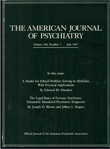The dexamethasone suppression test and depressive symptoms in early and late withdrawal from alcohol
Abstract
Results of the dexamethasone suppression test (DST) in 30 alcoholic patients tested on day 5 and again on day 25 after their last drink are presented. Nineteen patients (63%) failed to suppress cortisol on day 5; three (11%) failed to suppress cortisol on day 25. Depressive symptoms, measured by the Beck Depression Inventory, were significantly correlated with DST results; the lifetime diagnosis of depressive illness was not. The authors conclude that the DST is not useful in detecting primary affective disorders during the early phase of withdrawal from alcohol.
Access content
To read the fulltext, please use one of the options below to sign in or purchase access.- Personal login
- Institutional Login
- Sign in via OpenAthens
- Register for access
-
Please login/register if you wish to pair your device and check access availability.
Not a subscriber?
PsychiatryOnline subscription options offer access to the DSM-5 library, books, journals, CME, and patient resources. This all-in-one virtual library provides psychiatrists and mental health professionals with key resources for diagnosis, treatment, research, and professional development.
Need more help? PsychiatryOnline Customer Service may be reached by emailing [email protected] or by calling 800-368-5777 (in the U.S.) or 703-907-7322 (outside the U.S.).



